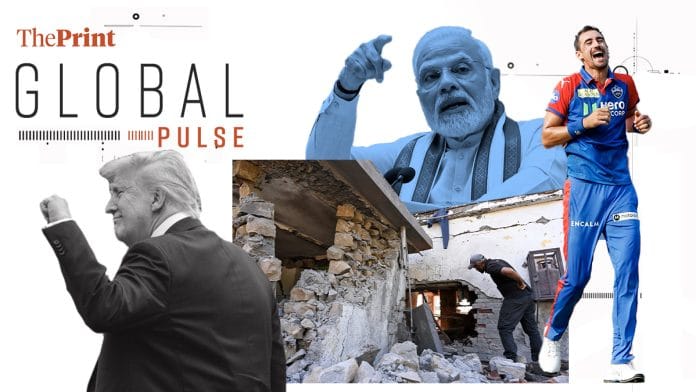New Delhi: The India-Pakistan conflict has never been bilateral—in fact, it’s quite the opposite, Tanvi Madan writes on special invitation in The Economist. Currently, both countries are in the middle of the Sino-American power tussle.
Third countries have played diverse roles—from crisis managers to military partners. But as India’s position in the global order rises, the US’s “ability to pressure India has waned”, Madan, host of Brookings Institution’s Global India podcast, adds.
“Last week’s flare-up has elicited international interest of another kind, because of its role as a testing ground,” says Madan.
“It saw Chinese and Western weaponry and systems used against each other (or against indigenous Indian platforms). Officials in Beijing and Western capitals will doubtless be closely analysing their performance, and the lessons that can be applied should they have to face off against each other.”
Despite this, she adds, both the US and China were hoping for a de-escalation.
“It was clear that America co-ordinated de-escalation efforts with a traditional player in this space—Britain—as well as a newer one, Saudi Arabia. The latter and the United Arab Emirates have been involved in recent India-Pakistan crisis-management efforts,” Madan noted. “The role of Russia, by contrast, appears to be decreasing; it was noticeably less full-throated in its support for India than it has been in past crises.”
The situation appears to be inching back to normal after officials in India and Pakistan held talks to extend “the tenuous ceasefire,” with stocks rising in both nations, Mujib Mashal and Hari Kumar report for The New York Times.
However, even after Donald Trump’s statement last evening, India has refused to acknowledge American intervention.
If Prime Minister Narendra Modi “were perceived as having caved to American pressure for a cease-fire against a weaker nation, it could cost him politically at home,” says the report. “Mr. Modi’s image rests in part on elevating India into a major power that would easily handle smaller nations in any conflict, and he raised expectations that India would deliver a decisive blow to Pakistan as tensions soared.”
In his address to the nation Monday night, PM Modi announced Operation Sindoor as the ‘new normal’. But the mood remains “jubilant” in Pakistan, Rick Noack, Niha Masih and Shaiq Hussain report in The Washington Post.
According to former Pakistani foreign minister Hina Rabbani Khar, India’s operation was a miscalculation. “It lacked the capability to defend itself against retaliation and misjudged Pakistan’s will and capacity to respond,” she told the Post.
“For us, the belief in India’s conventional superiority has collapsed. More weapons do not equate to superiority—it’s about how effectively you use them.”
However, in New Delhi, “analysts and commentators said the Indian leadership appeared far from deterred by Pakistan’s military response”.
According to the Financial Times, in the aftermath of the face-off, India has failed in its messaging—instead of focusing on terrorism, the international community is now focused on the nuclear threat
“Analysts said the fighting set a new paradigm for rapid escalation between the rivals. But they added that New Delhi had failed to foreground the issue of terrorism, its priority, as international attention instead focused on the nuclear threat,” write John Reed, Andres Schipani and Humza Jilani.
In a different kind of geopolitical reverberation, The Guardian reports that Australian cricketers are “reluctant” to return to India to play the IPL, which is resuming as of this weekend.
“Following the announcement that the IPL will resume on Saturday, Cricket Australia will support players in their individual decisions whether to return to India or not,” said a Cricket Australia spokesperson.
(Edited by Sanya Mathur)
Also Read: Global media’s view of Trump’s India-Pakistan ceasefire claim & India’s ‘game-changing’ strikes






